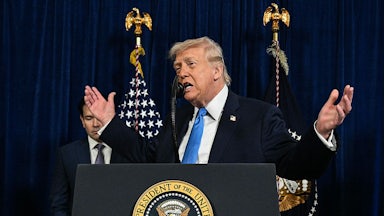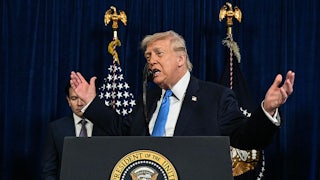One particularly sadistic aspect of Elon Musk’s and Donald Trump’s rampage through our government is that they’re cutting programs that are popular. To some observers, that might seem like bad politics, in line with the juvenile, amateur-hour image of this administration. But the unpopularity of some of these cost-cutting moves does not represent a goofy misstep on this administration’s part. Rather, it’s exactly the point.
Not only does the Inflation Reduction Act enjoy broad support—renewable energy even more so—but 80 percent of its manufacturing grants flow to red states. Some Republican politicians are now quietly complaining about how Musk’s (unconstitutional) cuts to the program will affect their districts. Republican elected officials bragged about these when the IRA first passed, which was funny since they didn’t vote for it, but you can see why they’d want to take credit for policy that made their constituents lives better and enjoyed bipartisan support. Last summer many Republican congresspeople wrote to Speaker Mike Johnson to warn him against a full repeal of the IRA or even an overzealous reform, fearing that would “undermine private investments and stop development that is already ongoing.”
The Environmental Protection Agency, to which Musk’s team of late adolescents is also laying waste (over a thousand employees were warned that they could be fired “immediately”) is also popular across party lines. While the phrase “climate change” may resonate more with some voters than others, and right-wing keyboard culture warriors are of course pleased that this government is scrubbing all mentions of that offending language, the EPA was founded by a Republican president—Richard Nixon. Moreover, when you look at most of what the EPA does, nearly everyone has been in favor of it. In 2016, the year Trump was first elected to office, a Pew survey found that almost three out of four Americans thought the government should do “whatever it takes” to protect the environment. Two years later, in the middle of the first Trump administration, a survey by the American Lung Association found overwhelming public approval of the EPA, and of the Clean Air Act; the ALA also found that by even larger majorities, Americans wanted the EPA to impose and enforce stricter limits on air pollution and smog. Indeed, tremendous bipartisan concern about microplastics and so-called forever chemicals, or PFAS, is one reason for Health and Human Services director Robert F. Kennedy Jr.’s popularity among young fitness guys and yoga moms alike. (They’re in for a disappointment, since it is going to be almost impossible for him to solve that problem with a much-reduced EPA.)
The Musk-Trump administration’s persistent targeting of popular programs is not limited to environmental topics. Most people favor public education and increased spending on public education. Yet Trump and Musk are seeking to abolish the Department of Education. Few people oppose Head Start, which has allowed some 40 million poor children to attend preschool, yet Musk has disrupted funding for many Head Start programs around the nation, in keeping with Project 2025, which calls for its elimination. Then there’s the Consumer Financial Protection Board, which was especially active and especially popular under Biden, also targeted for gutting. Lawmakers are being deluged with calls urging them to protect all these programs against Musk’s predations.
Sure, no one likes “government waste,” a powerful frame used to justify Musk’s interventions. And not everyone loves all federal government programs—not many are going to call their senators’ offices on behalf of the CIA or the IRS. But why pick on so many of the most popular ones?
Most likely, their popularity is precisely what the Trump-Musk administration dislikes about them. For anti-government ideologues, it’s important that people not have good experiences with the government. Every clean energy investment in your community, every Social Security check, every child enrolled in Head Start, every improvement in air and water quality, is a threat to right-wing ideological dominance. They know it, and they want to stop Americans from having those positive associations.
In Franklin D. Roosevelt’s time, the conservative elements in business class hated the New Deal—which was so popular that FDR was reelected three times—for the same reason. They knew that it would give rise to generations of Americans who felt fondly about the government programs that had fed their hungry families during the Depression, put their unemployed young people to work, and built beautiful public buildings and parks. The ruling class began mobilizing against the New Deal’s most beloved programs; an industry group called the Liberty League, as historian Kim Phillips-Fein wrote in her 2009 book, Invisible Hands: The Making of the Conservative Movement From the New Deal to Reagan, “took special pleasure in attacking Social Security.” And while some business interests used popular persuasion to try to fight what they saw as essentially a socialist consensus—using radio, billboards, and newspaper editorials to evangelize about “free enterprise”—many realized they couldn’t win that way. Instead, they relied on court challenges to labor protections and prepared for class conflict by stockpiling tear gas and machine guns in their factories. Like our current-day oligarchs, most New Deal opponents didn’t expect to win what they wanted through the democratic process.
The ruling class of the 1930s and ’40s would have loved to be in Elon Musk’s position. Although he and his young minions may seem merely like nihilistic psychos, they’re also conservatives doing something that makes rational sense for their political movement. By going after the most popular government programs, they are thinking long-term, planning for a world where no one defends government agencies because these agencies don’t do anything that we value. Elon Musk isn’t just trying to bypass all checks and balances, ignore popular will, plunder our public goods, and wreck the world, though he is doing all that. As we protest this vandalism, we need to remember that he aims to build a future in which we have nothing left to defend.








